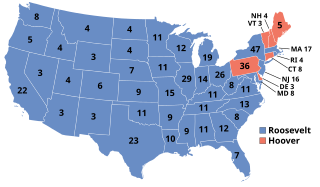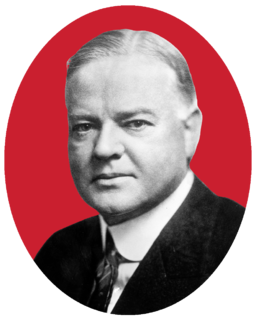
The 1932 United States presidential election was the 37th quadrennial presidential election, held on Tuesday, November 8, 1932. The election took place against the backdrop of the Great Depression. Incumbent Republican President Herbert Hoover was defeated in a landslide by Democrat Franklin D. Roosevelt, the Governor of New York and the vice presidential nominee of the 1920 presidential election. Roosevelt was the first Democrat in 80 years to win an outright majority in the popular and electoral votes, the last one being Franklin Pierce in 1852. Hoover was the last elected incumbent president to lose reelection until Jimmy Carter lost 48 years later. The election marked the effective end of the Fourth Party System, which had been dominated by Republicans.

The 1932 Summer Olympics, officially known as the Games of the X Olympiad and commonly known as Los Angeles 1932, was an international multi-sport event that was held from July 30 to August 14, 1932, in Los Angeles, California, United States.

The 1932 Winter Olympics, officially known as the III Olympic Winter Games and commonly known as Lake Placid 1932, were a winter multi-sport event in the United States, held in Lake Placid, New York. The games opened on February 4 and closed on February 15. It was the first of four Winter Olympics held in the United States; Lake Placid hosted again in 1980.

Broadcasting House is the headquarters of the BBC, in Portland Place and Langham Place, London. The first radio broadcast from the building was made on 15 March 1932, and the building was officially opened two months later, on 15 May. The main building is in Art Deco style, with a facing of Portland stone over a steel frame. It is a Grade II* listed building and includes the BBC Radio Theatre, where music and speech programmes are recorded in front of a studio audience.

The Holodomor, also known as the Terror-Famine and sometimes referred to as the Great Famine, was a famine in Soviet Ukraine from 1932 to 1933 that killed millions of Ukrainians. The term Holodomor emphasises the famine's man-made and intentional aspects such as rejection of outside aid, confiscation of all household foodstuffs and restriction of population movement. As part of the wider Soviet famine of 1932–1933 which affected the major grain-producing areas of the country, millions of inhabitants of Ukraine, the majority of whom were ethnic Ukrainians, died of starvation in a peacetime catastrophe unprecedented in the history of Ukraine. Since 2006, the Holodomor has been recognized by Ukraine and 15 other countries as a genocide of the Ukrainian people carried out by the Soviet government.

The 72nd United States Congress was a meeting of the legislative branch of the United States federal government, consisting of the United States Senate and the United States House of Representatives. It met in Washington, D.C. from March 4, 1931, to March 4, 1933, during the last two years of Herbert Hoover's presidency. The apportionment of seats in this House of Representatives was based on the Thirteenth Decennial Census of the United States in 1910. The Senate had a Republican majority. The House started with a very slim Republican majority, but by the time it first met in December 1931, the Democrats had gained a majority through special elections.

The Emu War, also known as the Great Emu War, was a nuisance wildlife management military operation undertaken in Australia over the later part of 1932 to address public concern over the number of emus said to be running amok in the Campion district of Western Australia. The unsuccessful attempts to curb the population of emus, a large flightless bird indigenous to Australia, employed soldiers armed with Lewis guns—leading the media to adopt the name "Emu War" when referring to the incident. While a number of the birds were killed, the emu population persisted and continued to cause crop destruction.

The United States Senate elections of 1932 coincided with Democrat Franklin D. Roosevelt's crushing victory over incumbent Herbert Hoover in the presidential election.

The 1932 United States House of Representatives elections was an election for the United States House of Representatives in 1932 which coincided with the landslide election of President Franklin D. Roosevelt.
The 1932 Democratic National Convention was held in Chicago, Illinois June 27 – July 2, 1932. The convention resulted in the nomination of Governor Franklin D. Roosevelt of New York for president and Speaker of the House John N. Garner from Texas for vice president. Beulah Rebecca Hooks Hannah Tingley was a member of the Democratic National Committee and Chair of the Democratic Party of Florida. She seconded the nomination of Franklin Delano Roosevelt, becoming the second woman to address a Democratic National Convention.

The 1932 Republican National Convention was held at Chicago Stadium in Chicago, Illinois, from June 14 to June 16, 1932. It nominated President Herbert Hoover and Vice President Charles Curtis for reelection.

The Great Depression was a severe worldwide economic depression that took place mostly during the 1930s, beginning in the United States. The timing of the Great Depression varied across the world; in most countries, it started in 1929 and lasted until the late 1930s. It was the longest, deepest, and most widespread depression of the 20th century. The Great Depression is commonly used as an example of how intensely the global economy can decline.

The 1932 United States presidential election in Pennsylvania took place on November 8, 1932 as part of the 1932 United States presidential election. Voters chose 36 representatives, or electors to the Electoral College, who voted for president and vice president.
The 1932 Madras and Southern Mahratta Railway strike was a general strike launched against the retrenchment policies of the Madras and Southern Mahratta Railway Company. The strike lasted from 24 October 1932 to 8 January 1933 and was moderate and non-violent in character as opposed to the 1928 South Indian Railway Strike which was extremely violent.

The 1932 United States elections were held on November 8, during the Great Depression. The presidential election coincided with U.S. Senate, U.S. House, and gubernatorial elections in several states. The election marked the end of the Fourth Party System and the start of the Fifth Party System. The election is widely considered to be a realigning election, and the newly established Democratic New Deal coalition experienced much more success than their predecessors had in the Fourth Party System.

The 1932 United States presidential election in New York took place on November 8, 1932. All contemporary 48 states were part of the 1932 United States presidential election. Voters chose 47 electors to the Electoral College, which selected the president and vice president.
The 1932 New South Wales state election was for 90 electoral districts each returning a single member with compulsory preferential voting.

The 1932 United States presidential election in Illinois took place on November 8, 1932, as part of the 1932 United States presidential election. State voters chose 29 representatives, or electors, to the Electoral College, who voted for president and vice president.

The 1932 Massachusetts gubernatorial election was held on November 8, 1932.